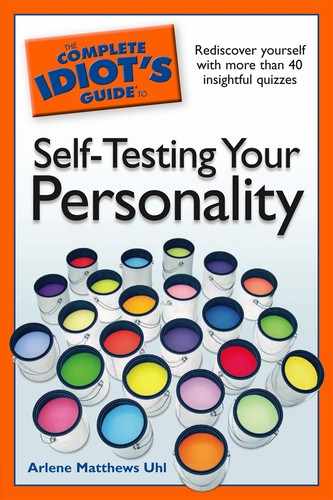Quiz 30
Do I Express Enough Gratitude?
A growing body of research shows that people who make a habit of expressing gratitude report feeling increased happiness, energy, and optimism. A 1998 Gallup survey of American adults and teenagers found that 95 percent of respondents felt at least somewhat happy when expressing gratitude, and over 50 percent felt extremely happy while they were doing so.
Feelings of thankfulness and appreciation have also been shown to contribute to overall health and well-being by stimulating the parasympathetic nervous system (the part of our autonomic nervous system that initiates relaxation); this increases levels of immune antibodies, stimulates the release of a beneficial, youth-preserving hormone called DHEA, and decreases levels of the stress-related hormone cortisol.
But being truly grateful means more than mumbling “thanks” when someone holds a door open or lets you get ahead of him in a supermarket checkout line. It involves cultivating an attitude of gratitude—the beneficial effects of which will be cumulative.
Do you display an attitude of gratitude? Take this quiz and find out.
Take the Test
For each of the following statements, indicate the number of the statement that corresponds to your level of agreement or disagreement:
1. Strongly disagree
2. Somewhat disagree
3. Feel neutral or are not sure
4. Somewhat agree
5. Strongly agree
1. I have a lot to be thankful for.
2. I notice good things in my life even on a bad day.
3. Looking back over my life, I see some experiences that were tough but yielded results I’m now thankful for.
4. I actively count my blessings.
5. I’m reluctant to express gratitude for fear I’ll tempt fate to send me some troubles.
6. I take all the credit for my own success.
7. If I made a list of people to whom I am thankful, it would be a long list.
8. I have thanked people face-to-face to whom I feel grateful.
9. I am afraid of looking weak or “uncool” if I openly express gratitude.
10. I keep a gratitude journal, noting things I am thankful for.
11. I never feel satisfied.
12. If I made a list of the good things in my life, it would be long and varied.
13. I often think about things I desire but do not have.
14. I offer prayers of thanks on a regular basis.
15. I envy people who are wealthier than me.
16. I often feel bored and ask, “Is this all there is?”
17. I believe that just the experience of being alive gives us all something to be thankful for.
18. I write notes or letters of thanks.
19. As I get older, I find more and more to be grateful for.
20. If I feel disappointed, I compare myself to others who are less fortunate.
Scoring and Explanation
Before tallying your total points, be sure to reverse the score (5 = 1, 4 = 2, 3 = 3, 2 = 4, 1 = 5) for the following items: 5, 6, 9, 11, 13, 15, 16. Remember, in reversing the score, high numbers are traded for low and vice versa. Unless you reverse the scores for the items listed—and only for the items listed—your result will be inaccurate. See the Introduction to this book for a full explanation of reverse scoring.
Tally your points:
• A score of 85-100 indicates that you display a high degree of gratitude. You take time to thank individuals and to acknowledge powers greater than yourself—whether you call those powers “fate” or “the universe” or the name of a specific deity. You see yourself as part of an interconnected whole, and this conviction brings you a degree of inner peace. The benefits of your thankfulness should accrue and expand over time, and will help you cope with whatever circumstances arise during the course of your life. You are likely to experience a higher magnitude of joy than most people, and even during tough times you will be more philosophical.
• A score of 70-84 indicates that you exhibit a moderate degree of thankfulness. You are certainly not above saying “thank you”—and you sincerely mean it when you do. But you could stand to do it more often and more consistently. (You probably already know this deep down.)
Consider this: once people develop a habitual practice of expressing gratitude, they are inclined to stick with it. In an experiment known as the “three good things” study (Seligman, Steen, Park, and Peterson, 2005), participants were asked to take a few minutes each evening and list three things that went well during their day. Sixty percent of the subjects in the experiment said they were still ending each day this way, six months after the experiment ended. To them, the ongoing benefits were obvious.
• A score of 69 or below suggests that you could do with a much higher dose of gratitude in your life. As it stands, you may be experiencing a continual and nagging sense of disappointment and dissatisfaction. Notice whether you are constantly chasing some material item that you think will make you happy, only to find that you quickly adapt to having that item and then crave something else. If this describes you, you are taking a proverbial walk on what social psychologists call the hedonic treadmill—meaning that you are fruitlessly chasing pleasures that actually don’t bring you much pleasure at all.
Reminding yourself what you have to be grateful for in the moment can help you quell the urge to jump on that hedonic treadmill. Imagine how your life might feel different to you if you stopped, caught your breath, and appreciated all that you already have—not just in a material sense, but in terms of your strengths, abilities, and positive relationships.
..................Content has been hidden....................
You can't read the all page of ebook, please click here login for view all page.
